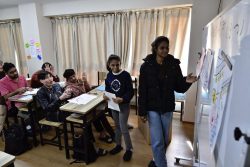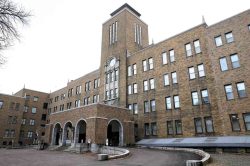Hidden funds: Consequences of a corrupt practice / Lawmakers from Abe faction ‘called for kickbacks to continue’

Former Prime Minister Shinzo Abe, fourth from right, attends a party given by the Liberal Democratic Party’s Abe faction in Minato Ward, Tokyo, in December 2021.
22:00 JST, January 21, 2024
Investigations into a scandal involving revenue from Liberal Democratic Party fundraising parties started after a university professor filed a criminal complaint in response to an autumn 2022 report in Shimbun Akahata, the newspaper of the Japanese Communist Party.
The complaint claimed that the party’s five factions did not include part of their revenue from fundraising parties in their political funds reports.
A prosecutor with the special investigation squad of the Tokyo District Public Prosecutors Office noticed something unusual in the Abe faction’s political funds reports.
While other factions included donations to lawmakers — the amount varied from several tens of thousands of yen to several millions of yen — in their political funds reports after faction parties, there were no such statements in the Abe faction’s reports. What the other factions were listing as donations in their reports were actually kickbacks to lawmakers from the revenue of party ticket sales.
The prosecutor wondered why the Abe faction’s reports did not include such donations to lawmakers. Subsequent inspections into bank accounts of people concerned revealed the flow of funds that were not listed in the Abe faction’s political funds reports.
Junichiro Matsumoto, 76, accounting manager of the Abe faction, put together the political funds reports. Matsumoto has been indicted without arrest on charges of violating the Political Funds Control Law.
Matsumoto is a former employee of NTT and previously headed a conservative political organization. He became the accounting manager of the Abe faction in February 2019, following the retirement of his predecessor.
Sources said that during voluntary questioning, Matsumoto told investigators that he simply followed procedures as told to him by his predecessor. He admitted that he did not list kickbacks to lawmakers in the faction’s political funds reports.
This convinced the special investigation squad that handling kickbacks as off-the-book funds was a long-time practice for the faction.
In response to requests by the special investigators squad, Matsumoto submitted a list of the amount of kickbacks from 2018 to 2022. The list contained the names of about 100 lawmakers, including faction executives who served in key government and party posts, as well as the amount of the kickbacks. These ranged from several tens of thousands of yen to more than ¥50 million.
The list caused prosecutors to strongly suspect that the faction had been systematically covering up the kickback scheme.
Faction executives questioned
Near the end of the extraordinary Diet session in December last year, the special investigation squad enhanced its organization and personnel by summoning additional prosecutors from across the country.
The prosecutors decided to determine what criminal punishments to pursue before the ordinary Diet session to be convened this month, so as not to excessively impact national politics.
After questioning secretaries of Abe faction lawmakers who received kickbacks, prosecutors questioned a number of lawmakers and searched the office of the Abe faction.
They subsequently searched the offices of lawmakers who had received a large amount of kickbacks, including House of Representatives member Yoshitaka Ikeda, 57. Ikeda was arrested on Jan. 7 on suspicion of violating the Political Funds Control Law.
With their investigation making rapid progress, the special squad finally moved to clarifying the involvement of faction executives in the allegations.
Their investigations came to focus on how the faction continued the scheme of off-the-books kickbacks after former Prime Minister Shinzo Abe died in July 2022. By analyzing the statements of people concerned, as well as materials they confiscated, the prosecutors gradually exposed the actions taken within the faction.
There were strong calls within the Abe faction to scrap Abe’s plan to abolish the kickbacks, and Ikeda also asked senior faction members to continue the practice.
In response to these calls, senior faction members discussed whether to continue with off-the-book funds, meeting at party headquarters or at the office of former Education, Culture, Sports, Science and Technology Minister Ryu Shionoya, 73, who served as acting leader of the faction.
Other persons present at the discussions included former education minister Hakubun Shimomura, 69; and former Economy, Trade and Industry Minister Yasutoshi Nishimura, 61, who was the faction’s secretary general.
One of them reportedly said that a lawmaker had “begged [them] to continue the practice.” Matsumoto reportedly joined the discussions at times.
The squad began interviewing senior Abe faction members at the end of last year to confirm whether they instructed Matsumoto not to record kickbacks, received any reports from him, or issued any permissions to him on the matter.
Accusations of scapegoating
Asked by prosecutors for the details on the decision to continue the practice, one senior member of the Abe faction repeatedly said they didn’t remember clearly because they were so busy dealing with the situation after Abe’s death.
Regarding the failure to report the kickbacks, the senior member said: “I knew about the kickbacks, but I’m not sure about [political fund] reports.”
Six other senior faction members also denied their involvement in the practice. They claimed, for instance, that the income was a matter for the head of the faction to decide.
Matsumoto also said he never was instructed by faction executives not to include kickbacks in the reports, which was consistent with statements made by senior faction members.
To hold Diet members responsible for the failure to include kickbacks in the reports, it needs to be proved that they conspired with their accounting managers. However, because many of the exchanges between the executives and Matsumoto were made over the phone and there were no detailed minutes of their meetings, no evidence was found to support a conspiracy.
“Based on our evidence, it was difficult to prove a conspiracy between faction leaders and their accounting manager,” Takashi Shinkawa, deputy chief prosecutor of the prosecutors office, said Friday, announcing that the squad had decided not to build a case against the executives of the Abe faction.
The fact that the squad indicted only Matsumoto for the Abe faction’s failure to report a total of ¥675 million in the reports spurred criticism that he was being scapegoated.
“I understand the public sentiment that it was impossible for the lawmakers not to know about the practice, but there are limits to what can be done under the current law,” a senior official of the Public Prosecutors Office said. “Now the problem is whether politicians who make laws will face up to this problem.”
Top Articles in Politics
-

Japan PM Takaichi’s Cabinet Resigns en Masse
-

Sanae Takaichi Elected Prime Minister of Japan; Keeps All Cabinet Appointees from Previous Term
-

Japan’s Govt to Submit Road Map for Growth Strategy in March, PM Takaichi to Announce in Upcoming Policy Speech
-

LDP Wins Historic Landslide Victory
-

LDP Wins Landslide Victory, Secures Single-party Majority; Ruling Coalition with JIP Poised to Secure Over 300 seats (UPDATE 1)
JN ACCESS RANKING
-

Producer Behind Pop Group XG Arrested for Cocaine Possession
-

Japan PM Takaichi’s Cabinet Resigns en Masse
-

Man Infected with Measles Reportedly Dined at Restaurant in Tokyo Station
-

Israeli Ambassador to Japan Speaks about Japan’s Role in the Reconstruction of Gaza
-

Videos Plagiarized, Reposted with False Subtitles Claiming ‘Ryukyu Belongs to China’; Anti-China False Information Also Posted in Japan
























